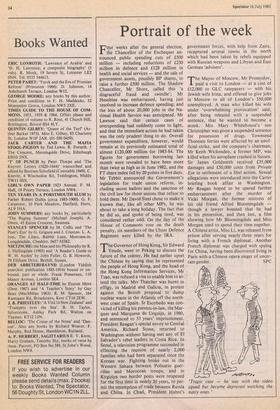Portrait of the week
Four weeks after the general election, the Chancellor of the Exchequer an- nounced public spending cuts of £500 million — including reductions of £230 million in defence and £128 million in health and social services — and the sale of government assets, possibly BP shares, to raise a further £500 million. The Shadow Chancellor, Mr Shore, called this 'a disgraceful fraud and swindle'; Mr Heseltine was embarrassed, having just resolved to increase defence spending; and the loss of about 20,000 jobs in the Na- tional Health Service was anticipated. Mr Lawson said that certain cases of overspending had suddenly come to light, and that the immediate action he had taken was the only prudent thing to do. Overall government expenditure, however, would remain at its previously estimated total of almost £120,000 million for 1983-84. The figures for government borrowing last month were revealed to have been more than twice as high as in June 1982, and the FT share index fell by 20 points in five days. Mr Tebbit announced the Government's legislation for trade union reform, in- cluding secret ballots and the sanction of the civil law for those unions that refuse to hold them. Mr David Steel chose to make it known that, like all other MPs, he was about to take a long holiday. The fact that he did so, and spoke of being tired, was considered rather odd. On the day of the House of Commons vote on the death penalty, six members of the Ulster Defence Regiment were killed by the IRA.
The Governor of Hong Kong, Sir Edward Youde, went to Peking to discuss the future of the colony, He had earlier upset the Chinese by saying that he represented the people of Hong Kong, and the head of the Hong Kong Information Services, Mr Tsao, was refused a visa to enable him to at- tend the talks. Mrs Thatcher was burnt in effigy, in Madrid and Galicia, in protest against the British proposal to dump nuclear waste in the Atlantic off the north- west coast of Spain. Sr Escobedo was con- victed of killing his parents-in-law, the Mar- ques and Marquesa de Urquijo, in 1980, and sentenced to 53 years' imprisonment. President Reagan's special envoy to Central America, Richard Stone, returned to Washington without having met any of El Salvador's rebel leaders in Costa Rica. In Seoul, a television programme succeeded in effecting the reunion of nearly 2,000 families who had been separated since the Korean war. Fighting broke out in the Western Sahara between Polisario guer- rillas and Moroccan troops, and in Kirgiziya two border posts were reopened for the first time in nearly 20 years, to per- mit the resumption of trade between Russia and China. In Chad, President Habre's
government forces, with help from Zaire, recaptured several towns in the north which had been taken by rebels equipped with Russian weapons and Libyan and East German 'advisers'.
The Mayor of Moscow, Mr Promyslov, paid a visit to London — at a cost of £12,000 to GLC ratepayers — with his Jewish wife Irina, and offered to give jobs in Moscow to all of London's 350,000 unemployed. A man who killed his wife under 'overwhelming provocation' said, after being released with a suspended sentence, that he wanted to become a monk. Mrs Mary Whitehouse's son Christopher was given a suspended sentence for possession of drugs. Townsend Thoresen ferries were affected by an unof- ficial strike, and the company's chairman, Mr Keith Wickenden, a former MP, was killed when his aeroplane crashed in Sussex, Sir James Goldsmith received £35,000 damages and £50,000 costs from Private Eye in settlement of a libel action. Sexual allegations were introduced into the Carter briefing book affair in Washington. Mr Reagan hoped to be spared further embarrassment after the murder of Vicki Morgan, the former mistress of his old friend Alfred Bloomingdale — though a lawyer boasted that he had in his possession, and then lost, a film showing how Mr Bloomingdale and Miss Morgan used to spend their time together. A Chinese artist, Miss Li, was released from prison after serving nearly three years for living with a French diplomat. Another French diplomat was charged with spying for China, having been discovered living in Paris with a Chinese opera singer of uncer-
'Tragic case — he was with the video squad but became depraved watching the nasty ones.'






































 Previous page
Previous page